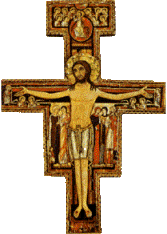Reflection upon a few paragraphs from Mirror of Christ: Francis of Assisi, by Isidore O'Brien, O.F.M.; St. Anthony's Guild, Paterson, NJ; 1944 [Pgs. 157-158]
He [Francis] who lived so completely the Gospel realized with a clarity grasped by so few the evangelical truth that penance, sincere and strong, must precede peace, as the needle must precede the thread.
The above observation uses an unusually keen image to explain one of the principles of Francis with brilliance. It is so perceptive that we should devote special attention to its meaning and its guidance.
Francis possesses a deep appreciation for the consequence of 'our fallen nature'; the effects of sin and the resulting chaos that distorts all our relations. He preaches penance as the way to 'restore order', which is ultimately what we mean when we speak of 'building peace'. Stated another way, 'peace' is a reflection of our harmony with God. St. Augustine called this 'the tranquility of right order; and a necessary precondition for this state is a change in heart, or repentance.
This opens the way for peace.
Francis saw clearly: sin had thrown the whole moral world out of balance; only the practice of penance and co-operation with grace could restore that balance for the individual and the world; only in that balance would men find peace. Therefore he preached penance…
The great announcement of the Gospel is not 'Listen and believe the Good News.' It is clearly 'Repent and believe the Good News.' [Mark 1:15] Repentance begins by acknowledging that we have offended God which results in discord; and subsequently, accepting the 'right order' of God's way - which has among its fruit, 'peace'. Of course, the change we call repentance, is not a one time act. The Seraphic Saint preached that conversion was daily and ongoing. It is strengthened and renewed in daily penitential practices which are vital for those who would bring about peace.
One of the chief goals of doing penance is to draw attention to what is most important and to strip away deceptions and pretexts that hide truth. This invariably involves the difficult process of dying to oneself and overcoming selfishness. Francis describes the Penitent in this way; as one who…'loves the Lord with their whole soul and mind and strength, and love their neighbors as themselves, and hate their bodies with their vices and sins…and produce worthy fruits of penance.' 'Hating one's body with its vices and sin', is to detest whatever it is in our 'fallen state' that causes us to reject God; and as an antidote, to take up the life of penance with the help of grace, to reestablish harmony with God. The penitential life is a sacrificial life: a life in which everything is viewed and judged in the light of God. Priorities are modified or reversed, while simultaneously, trust in 'Abba' our loving Father is strengthened. Peace is gathered as a harvest. Life is nourished in Peace.
… and one on the chief fruits of his preaching was the formation of the Order of Penitents, [The Third Order]: an institution that brought peace to individuals and cities and communities and even to nations...
The Catechism tells us that…'Respect for and development of human life requires peace' [CCC 2304]. It's this characteristic that demands our steadfast commitment and labor. How will we, as today's enlistment in the 'Order of Penitents', account for our time and effort in building peace? Peace as saving ointment and healing balm, (as opposed to faithless 'peacemaking' bombs), for the rest of the world.
To seek political or temporal peace is certainly one of Francis' legacies. Yet it understates what is called for in our vocation as peacemakers. To reveal to fellow human beings the beauty of Peace as 'harmony with God', (and therefore each other and Creation), is the highest form of peacemaking. Those who can see clearly what St. Francis saw, namely the relation between penance and peace; will be delighted to put that insight into practice.
Reading the Prologue to our Rule and connecting 'peace' with what it means to 'do penance' and 'not do penance', will open our hearts and help us to shun chaos and restore right order. "Oh, how happy and blessed are these men and women when they do these things and persevere in doing them because 'the spirit of the Lord will rest upon them' and he will 'make his home and dwelling among them'…"
True Penitents are not glum and their call is never outdated. They are in great demand. They bring something essential to the world: God's Peace.
Penance Must Precede Peace
Subscribe to:
Post Comments (Atom)





No comments:
Post a Comment